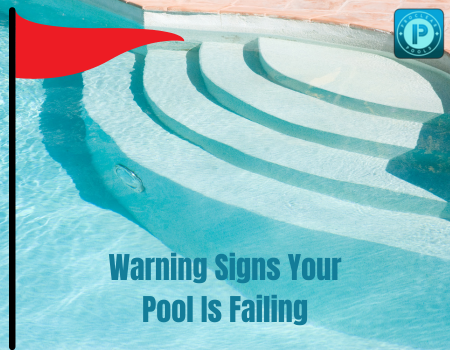Like any other home feature, pools can experience issues over time. Whether it’s an issue with the pool’s structure, plumbing, filtration, or other components, it’s important to recognize the warning signs that your pool may be failing before they escalate into costly repairs.
Common Warning Signs to Be on The Lookout For
-
 Pool Water That Won’t Stay Clear
Pool Water That Won’t Stay Clear
One of the most obvious warning signs that something might be wrong with your pool is water that won’t stay clear. If your pool’s water is cloudy, murky, or discolored despite regular cleaning, the cause could be a number of factors, including problems with the pool’s filtration system or water chemistry.
- Clogged or Broken Filter: Your pool’s filter is responsible for removing dirt and debris from the water. If it’s clogged or malfunctioning, it may not be able to clean the water effectively, resulting in cloudy or dirty water.
- Poor Water Circulation: Poor water circulation can lead to stagnant areas in the pool, allowing dirt and debris to collect. This often happens when the pool pump is not running properly or if there are issues with the skimmers and return jets.
If you notice that your pool water is not clearing up despite adjustments to the chemical balance and cleaning efforts, it’s a good idea to have the filter and pump checked by a professional.
- Persistent Algae Growth
Algae growth is another major warning sign that something may be wrong with your pool. Algae thrive in pools with poor circulation, inadequate sanitation, or improper water chemistry. If you constantly find yourself battling algae in your pool, there could be an underlying issue that needs addressing.
- Ineffective Filtration: A malfunctioning filtration system can prevent your pool from staying properly sanitized, leading to the growth of algae.
- Improper Chemical Balance: Algae can also form if the water’s pH, chlorine levels, or alkalinity are out of balance. This can weaken the chlorine’s effectiveness, allowing algae to thrive.
If you have persistent algae issues despite shock treatments and maintaining proper water chemistry, it might be time to inspect the pool’s filtration system and circulation.
- Leaks or Constantly Low Water Levels
Pools should not lose water unless it’s being splashed out or evaporating on hot days. If you notice that the water level consistently drops faster than usual, it could be a sign of a leak.
- Leaks in the Pool Structure: Leaks in the pool’s shell can cause water to seep out over time. Cracks in the pool’s surface, particularly around the pool’s walls or floor, are a major indicator of a structural issue.
- Plumbing Leaks: Leaks in the pool’s plumbing system can also cause a drop in water levels. This may happen in the pipes, return lines, or even at the pump and filter connections.
If you suspect a leak, performing a bucket test or consulting a professional pool technician can help determine if you have a leak and where it’s coming from. Promptly fixing leaks is important to avoid further damage and prevent wasted water.
- Cracks in the Pool’s Surface
Visible cracks in the pool’s surface are one of the most concerning warning signs that your pool might be failing. Cracks can develop in concrete, fiberglass, or vinyl pools over time due to shifting ground, wear and tear, or improper installation.
- Structural Damage: Cracks in the pool’s walls or floor could lead to serious structural issues, allowing water to escape or causing further deterioration of the pool shell.
- Water Leaks: Cracks can also allow water to leak from the pool, worsening any existing leak issues.
If you spot cracks in the pool, it’s crucial to have them inspected and repaired immediately to prevent further damage.
- Unusual Pool Pump Noises
The pool pump is a vital component of your pool’s circulation system, and if it starts making unusual or loud noises, it’s a warning sign that something is wrong.
- Grinding or Screeching Noises: Grinding, squealing, or screeching sounds usually indicate that there’s an issue with the pump’s motor or bearings. This could mean that the motor is wearing out or that debris is caught in the pump.
- Humming or Buzzing: A humming or buzzing sound can indicate an electrical issue, such as a malfunctioning capacitor or a pump that’s struggling to start.
If your pool pump is making odd noises, it’s important to address the issue quickly before the pump fails completely. A pool technician can diagnose the problem and either repair or replace the motor.
- Pool Tiles and Coping Are Loose or Cracked
The tiles and coping around the edge of your pool provide both aesthetic value and protection for the pool structure. If you notice that tiles are loose, cracked, or missing, it could be a warning sign of movement in the pool’s foundation, structural damage, or exposure to harsh weather conditions.
- Shifting or Settling: Shifting ground or settling around the pool can cause the coping or tiles to loosen or crack.
- Water Damage: Water infiltration under the tiles can also cause them to loosen and crack over time, leading to more serious structural damage.
Loose or cracked tiles should be replaced or repaired promptly to prevent water from getting behind them and causing further damage.
- Ineffective Heating
If you have a pool heater and it’s no longer maintaining a consistent temperature or functioning properly, it could be a sign that the heater is failing. Common causes of heater issues include a malfunctioning thermostat, clogged filters, or faulty gas or electrical connections.
Recognizing the warning signs that your pool is failing is crucial to avoiding costly repairs and maintaining your pool’s safety and functionality. Regular maintenance and monitoring can help prevent many of these issues, but if you notice any of these warning signs, don’t hesitate to contact a professional pool technician.
